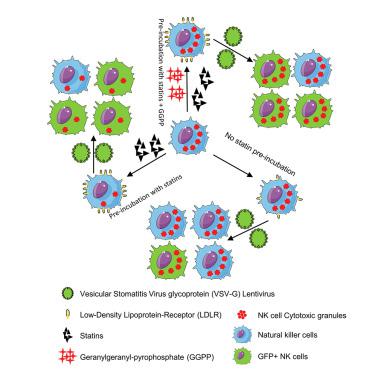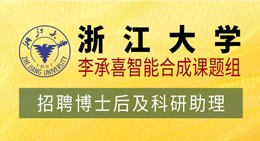当前位置:
X-MOL 学术
›
Mol. Ther. Methods Clin. Dev.
›
论文详情
Our official English website, www.x-mol.net, welcomes your
feedback! (Note: you will need to create a separate account there.)
Rosuvastatin Enhances VSV-G Lentiviral Transduction of NK Cells via Upregulation of the Low-Density Lipoprotein Receptor.
Molecular Therapy - Methods & Clinical Development ( IF 4.6 ) Pub Date : 2020-03-29 , DOI: 10.1016/j.omtm.2020.03.017
Ying Gong 1, 2 , Roel G J Klein Wolterink 1, 2 , Ian Janssen 1, 2 , Arjan J Groot 2, 3 , Gerard M J Bos 1, 2, 4 , Wilfred T V Germeraad 1, 2, 4
Molecular Therapy - Methods & Clinical Development ( IF 4.6 ) Pub Date : 2020-03-29 , DOI: 10.1016/j.omtm.2020.03.017
Ying Gong 1, 2 , Roel G J Klein Wolterink 1, 2 , Ian Janssen 1, 2 , Arjan J Groot 2, 3 , Gerard M J Bos 1, 2, 4 , Wilfred T V Germeraad 1, 2, 4
Affiliation

|
Adoptive natural killer (NK) cell therapy is attaining promising clinical outcomes in recent years, but improvements are needed. Genetic modification of NK cells with a tumor antigen-specific receptor on their surface coupled to intracellular signaling domains may lead to enhanced cytotoxicity against malignant cells. One of the most common approaches is by lentivirus-mediated transduction. However, NK cells are difficult to transduce and various methods have been attempted with different success rates. Because the low-density lipoprotein-receptor (LDLR) is the receptor of vesicular stomatitis virus (VSV) and is expressed only at low levels on NK cells, we tested the potential of 5 statins and 5 non-statin compounds to increase the LDLR expression, thereby facilitating viral transduction. We found that the transduction efficiency of VSV-G pseudotyped lentivirus is augmented by statins that induced higher LDLR expression. In both NK-92 cells and primary NK cells, the transduction efficiency increased after treatment with statins. Furthermore, statins have been reported to suppress NK cell cytotoxicity; however, we showed that this can be completely reversed by adding geranylgeranyl-pyrophosphate (GGPP). Among the statins tested, we found that the combination of rosuvastatin with GGPP most potently improved viral transduction without affecting the cytotoxic properties of the NK cells.
中文翻译:

罗苏伐他汀通过上调低密度脂蛋白受体来增强NK细胞的VSV-G慢病毒转导。
近年来,过继性自然杀伤(NK)细胞疗法取得了可喜的临床结果,但仍需要改进。对NK细胞进行表面修饰,使其表面具有与细胞内信号传导域偶联的肿瘤抗原特异性受体,可以进行遗传修饰,从而增强针对恶性细胞的细胞毒性。最常见的方法之一是通过慢病毒介导的转导。然而,NK细胞难以转导,并且已经尝试了各种方法以不同的成功率。由于低密度脂蛋白受体(LDLR)是水泡性口腔炎病毒(VSV)的受体,并且仅在NK细胞上以低水平表达,因此我们测试了5种他汀类和5种非他汀类化合物增加LDLR表达的潜力,从而促进病毒转导。我们发现,通过诱导更高的LDLR表达的他汀类药物,VSV-G假型慢病毒的转导效率得到了提高。在他汀类药物治疗后,NK-92细胞和原代NK细胞的转导效率均提高。此外,据报道他汀类药物可抑制NK细胞的细胞毒性。但是,我们表明,通过添加香叶基香叶基焦磷酸酯(GGPP)可以完全逆转这一现象。在所测试的他汀类药物中,我们发现瑞舒伐他汀与GGPP的结合最有效地改善了病毒的转导,而不影响NK细胞的细胞毒性。他汀类药物可抑制NK细胞的细胞毒性。但是,我们表明,通过添加香叶基香叶基焦磷酸酯(GGPP)可以完全逆转这一现象。在所测试的他汀类药物中,我们发现瑞舒伐他汀与GGPP的结合最有效地改善了病毒的转导,而不影响NK细胞的细胞毒性。他汀类药物可抑制NK细胞的细胞毒性。但是,我们表明,通过添加香叶基香叶基焦磷酸酯(GGPP)可以完全逆转这一现象。在所测试的他汀类药物中,我们发现瑞舒伐他汀与GGPP的结合最有效地改善了病毒的转导,而不影响NK细胞的细胞毒性。
更新日期:2020-03-29
中文翻译:

罗苏伐他汀通过上调低密度脂蛋白受体来增强NK细胞的VSV-G慢病毒转导。
近年来,过继性自然杀伤(NK)细胞疗法取得了可喜的临床结果,但仍需要改进。对NK细胞进行表面修饰,使其表面具有与细胞内信号传导域偶联的肿瘤抗原特异性受体,可以进行遗传修饰,从而增强针对恶性细胞的细胞毒性。最常见的方法之一是通过慢病毒介导的转导。然而,NK细胞难以转导,并且已经尝试了各种方法以不同的成功率。由于低密度脂蛋白受体(LDLR)是水泡性口腔炎病毒(VSV)的受体,并且仅在NK细胞上以低水平表达,因此我们测试了5种他汀类和5种非他汀类化合物增加LDLR表达的潜力,从而促进病毒转导。我们发现,通过诱导更高的LDLR表达的他汀类药物,VSV-G假型慢病毒的转导效率得到了提高。在他汀类药物治疗后,NK-92细胞和原代NK细胞的转导效率均提高。此外,据报道他汀类药物可抑制NK细胞的细胞毒性。但是,我们表明,通过添加香叶基香叶基焦磷酸酯(GGPP)可以完全逆转这一现象。在所测试的他汀类药物中,我们发现瑞舒伐他汀与GGPP的结合最有效地改善了病毒的转导,而不影响NK细胞的细胞毒性。他汀类药物可抑制NK细胞的细胞毒性。但是,我们表明,通过添加香叶基香叶基焦磷酸酯(GGPP)可以完全逆转这一现象。在所测试的他汀类药物中,我们发现瑞舒伐他汀与GGPP的结合最有效地改善了病毒的转导,而不影响NK细胞的细胞毒性。他汀类药物可抑制NK细胞的细胞毒性。但是,我们表明,通过添加香叶基香叶基焦磷酸酯(GGPP)可以完全逆转这一现象。在所测试的他汀类药物中,我们发现瑞舒伐他汀与GGPP的结合最有效地改善了病毒的转导,而不影响NK细胞的细胞毒性。

































 京公网安备 11010802027423号
京公网安备 11010802027423号